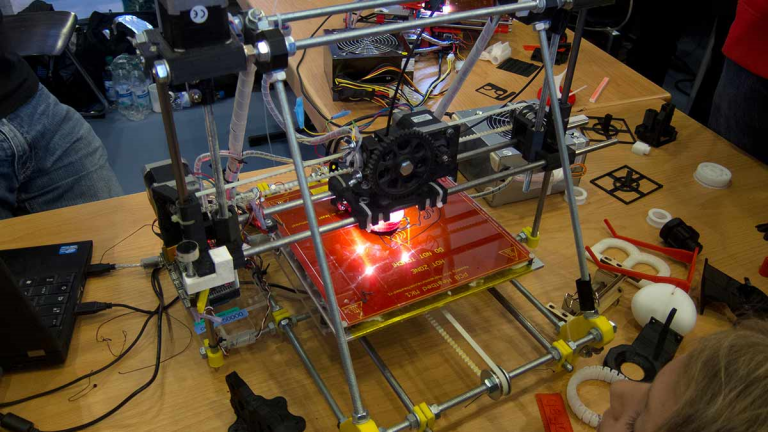The advent of 3D printing promises some of the most exciting possibilities for advancing freedom in the 21st century. Once relegated to the creation of industrial models, there now seems to be no limit to what these devices can offer, from the printing of firearms to prosthetic limbs for amputees. The latest innovation, just on the horizon, is the potential to use 3D printers to produce medicine right in the comfort of your own home. As Reason Magazine reports, chemist Lee Cronin has been working to make 3D printed medicines a reality, and he’s succeeding. 3D printed medicines have already been used in the lab; the first commercially available one came online in March of this year.
The benefits to such a system are huge. One of the major problems with pharmaceutical production is that it’s often not worth the investment to develop customized drugs for very rare illnesses. 3D printing solves that problem by letting patients create their own customizations without the intervention of big drug companies. I recently wrote a piece about patients who can’t get access to lifesaving drugs because the FDA has yet not approved them. Imagine what an impact this technology could have on the lives of those people and their families if it becomes widely available!
Disintermediation is a big, fancy word for getting the middleman out of the way. In fact, the history of technology has largely been about transferring power from the hands of a few elites to the broader population. Once upon a time, pretty much the only people who could read or write were employed by the church. If you wanted to know what something said, for example, the Bible, you had to ask them and trust that they were telling you the truth. But as the moveable type printing press made books more affordable and more widely available, literacy rates improved, and people were able to access that knowledge for themselves.
The internet did the same thing for every variety of knowledge. When you hear about a scientific study whose conclusion you doubt, you don’t have to take it on faith from the media, you can go online and read the study yourself. If you want to know how your elected representative voted on a particular bill, you can find out with the click of a button. They can’t get away with misrepresenting their votes anymore.
Digital cameras have placed the once highly specialized field of photography at everyone’s fingertips. Sure, people still pay top dollar for high quality wedding photography, but for anything less formal, you can simply do it yourself and it will look pretty good. TurboTax has put many a tax preparer out of business, and Uber makes taxi dispatchers obsolete. The list goes on and on; as technology advances, the middlemen, the guardians of knowledge, give way to more direct access by the people. Just like all these other technological breakthroughs, 3D printed medicines have the potential to break down the barriers that separate patients who need treatment from the medicine that could treat them.
Of course, not everyone is going to be happy about these changes, least of all pharmacists, who could well find their status as gatekeepers at the threshold of medicine threatened by this technological breakthrough. And then, of course, there’s always the potential for people to abuse the technology by using it to manufacture illegal drugs for recreational use. Cronin thinks there may be a solution to that, in that the manufacturers of 3D printers and the chemical “ink” they use could install security measures that prevent unauthorized tampering, much like manufacturers of smartphones do now.
Regulators will doubtless panic over the possibilities and overreact, as they always do, trying to keep “dangerous” technology out of the hands of the masses. It’s probably only a matter of time, however, before those barriers crumble too, and people will be able to produce anything they want, any time they want, and to me at least, the possibilities are nothing less than thrilling.
This article originally appeared on Conservative Review.














Add comment